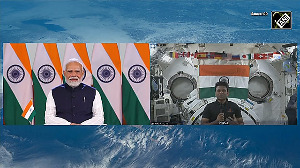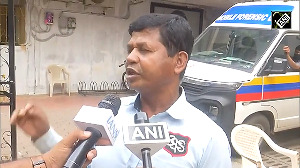 Pakistani Prime Minister Yousuf Raza Gilani said unless the "core issues" of Kashmir and sharing of river waters are resolved, ties between India and Pakistan cannot improve.
Pakistani Prime Minister Yousuf Raza Gilani said unless the "core issues" of Kashmir and sharing of river waters are resolved, ties between India and Pakistan cannot improve.
He said there was a need for resumption of dialogue and enhanced cooperation in intelligence sharing with India.
"We want bilateral relations with India but we do not want interference of India through other countries," he said.
Gilani said he had taken up the issue of alleged Indian interference in Balochistan with Prime Minister Manmohan Singh in their meeting at Sharm el-Sheikh in July last year and they had agreed to discuss all core issues, including Kashmir, sharing of waters and Balochistan.
The Mumbai attacks should not be allowed to hold the India-Pakistan peace process hostage, as dialogue is the only way forward, he said.
Gilani rejected reports of differences with ruling Pakistan People's Party chief Asif Ali Zardari on Friday and said he would "rise and fall" with the president.
"Certainly yes," Gilani replied when asked whether he would stand by Zardari in an interview with a news channel, asserting he would "rise and fall" with the president.
He said he did not believe there were any conspiracies being hatched against his government.
The people had reposed full confidence in the country's leadership despite the graft cases filed against them by authorities under the previous military regime, he said.
Such cases against slain former premier Benazir Bhutto, her mother Nusrat Bhutto and Zardari were not new and existed even when the party contested the 2008 elections and came to power, he noted.
Asked if he, as Pakistan's chief executive, would decide to re-open graft cases against Zardari in Swiss courts, Gilani said, "We will cross the bridge when it comes... Let the detailed judgement come (of the Supreme Court judgement scrapping a graft amnesty that benefited Zardari)."
Commenting on the government's stand on demands for the resignation of public office holders who were affected by the apex court's ruling, Gilani said they were facing allegations rather than convictions.
"And if you start levelling allegations, then no one in Pakistan gets spared," he said.
On the National Reconciliation Ordinance -- the graft amnesty struck down by the apex court -- Gilani said it was "unfair" to hold Zardari alone responsible for it and instead all those who had a role in its promulgation should be made answerable.
Gilani described army chief Gen Ashfaq Parvez Kayani as his personal friend. He said Kayani is "highly professional and pro-democracy".
He agreed with main opposition Paskistan Muslim League-N chief Nawaz Sharif's demand to abolish the 17th constitutional amendment, which was introduced by former military ruler Pervez Musharraf to give the President sweeping powers.
This issue will be addressed by a constitutional reforms committee that is working to restore the 1973 constitution to its original form, he added.
Referring to US-Pakistan ties, Gilani said, "We have to be on the same page as they can't win the war (on terror) without Pakistan and we need a stable Afghanistan."
"It is in the interest of Pakistan that there is a stable Afghanistan".
Image: Pakistani Prime Minister Yousuf Raza Gilani






